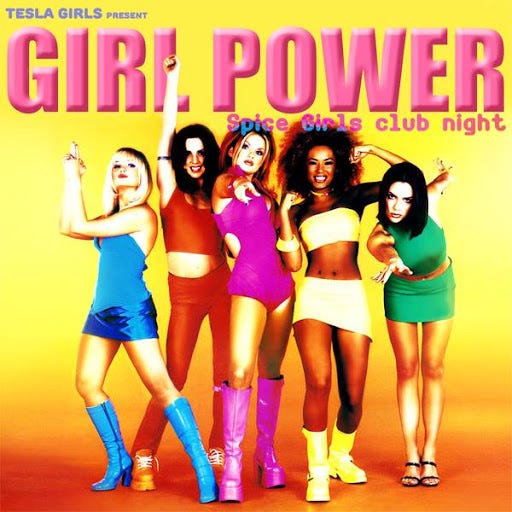Is self employment harder for women?
From hormones to childcare - some issues affect us disproportionately
I’m keeping Out Of Office newsletters free, because I think every self-employed woman deserves as much support as possible. Want to say thanks? I am very tired and need all the flat whites I can get…(even if currently my cafe days are on hold)
Morning, Colleague
Eeesh… Hard to know what to say right now, isn’t it? A new lockdown is looming, which somehow feels extra tough when you run your own business. (Especially if - like me - you were ineligible for the self-employment grants.)
If you’re struggling, make sure to continue reaching out to others - including me. Just hit reply. Let me know in particular if there are any topics I can cover to make Lockdown 2: (Just When You Thought It Was Safe To Go Outside), any easier.
Not to further lower the mood, but this week’s issue is examining the thorny issue of gender and work….

Do women have it harder than men when it comes to working for ourselves?
(Using ‘women’ here, meaning anyone who identifies as a woman, but of course these issues can affect people across the gender spectrum.)
Self-employment is having a boom amongst women. (I’ve actually covered some of the reasons why for a Marie Claire article).
As most of you know – or will come to know when you make the leap – there are some incredible perks, especially in terms of flexibility (in theory, at least!), which means it can appeal to working mothers in particular.
That said… what with hormone fluctuations, societal expectations and a little issue I like to call ‘oh god, how can I fit in a baby around all of this?’ there are certain areas of work that are harder for women living in a patriarchal society. It’s one of the reasons I wanted to start this newsletter for anyone who identifies as a woman, in particular. As much as I’d like it not to be the case – we face some unique challenges.
Career coach and psychologist Katie Woodland agrees. “Women and men are usually very different, and I don’t think we acknowledge this enough,” she says. “Because we’re a product not just of genetics, but also how we were raised and our life experiences.” For example, if you were brought up to believe that you needed to be a care-giver – most likely a wife and/or mother – that can be some serious pressure, before you’ve even decided if you actually want those things.
Here are some of the main differences we face when it comes to our work and bodies (and this is without even looking at the pay gap, because I can’t even go there right now…)
Once you’re aware of the potential pitfalls of gender within self-employment, it gets a little easier to work around them - or even use them to your advantage.

Hormones
People who menstruate are constantly feeling the effects of hormonal cycles, even if we try to ignore it.
“For three days of the month, I am mentally useless,” says Katie. “I just want to watch Disney films and cry – this is not the time to be building a business, yet no one talks about that.”
If you’re having a slump, Katie’s first piece of advice is to see where you are in your cycle, if applicable. “Stop looking at things in isolation. Use an app to keep track of things – I have a Fitbit and it warns me in advance. The benefit of working for yourself is if you’re having a rubbish day, you can just show up for the essentials. You can always get some work in over the weekend if you need to, and are able to find the time.
“Honour your biological mechanisms and the world will shift.”
The selling ick
This is obviously a stereotype, but many women feel a bit uncomfortable when it comes to selling things. You might, of course, be a natural salesperson – but for many who are raised to be ‘giving’ above all else, asking for £££ in exchange for their time and efforts can feel like a conflict.
“It’s certainly something I had to learn to do,” says Katie. “I went through the Kendrick Shoppe Sales School, which taught me to reframe how I saw it. When people have a problem, and you’re able to sell them something that helps (whether it’s coaching or a physical product), you’re helping them.
“By not selling whatever you offer, you’re allowing people to stay in a state of unhappiness, or even illness, depending on the product. Selling can actually be about bringing joy.”
The baby issue…
Our inequality is particularly clear if you plan to have children. Besides the issue of affording maternity leave (or worrying about the impact of time off), in heterosexual couples it’s still a rarity to find fathers as the primary care-givers.
“Combining work and motherhood can take a toll on your mental health,” says Katie. “You might be dealing with judgment, guilt, exhaustion and looking at other people for a measure of your success.
“It’s all very well when a male entrepreneur says he starts work at 5am – we’d all be massive successes in business after nine months if we were able to work those hours. You have to accept that it’s going to take you longer to reach those goals, but it doesn’t mean you’re unsuccessful.
“Try to honour the fact that your life is your life – spend time with your family where you can, and trust that your business will get where you want it to be in time. “
Katie’s top tip for fighting the fear: judge yourself on where you are compared to where you started, rather than how far you are from where you want to be. (This really speaks to me at the moment, when there is so much I feel I should be doing for the newsletter, but only so many hours in the day.)
Ultimately, it’s clear there’s a long way to go with supporting self-employed people of all genders in this country. But acknowledging some of the issues we face, and knowing you’re not alone in feeling frustrated can - hopefully - make all the difference.
As always, feel free to reply and let me know your thoughts on this, or any other topic.
Fancy a (free) post-work drink and mutual venting session via Zoom? I’m keen to create a community of self-employed folk so we can all feel less alone. Let me know if you’d be keen, by hitting reply!
Come and join the OOO Facebook page



